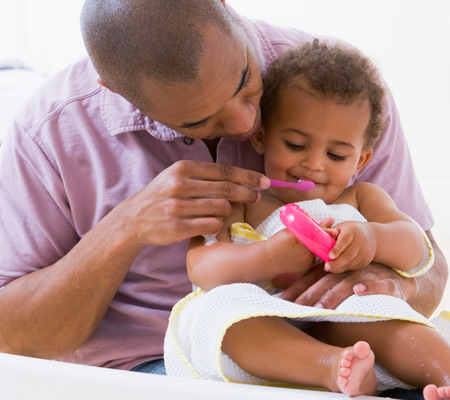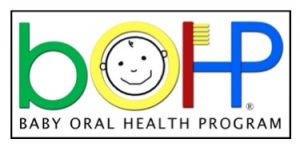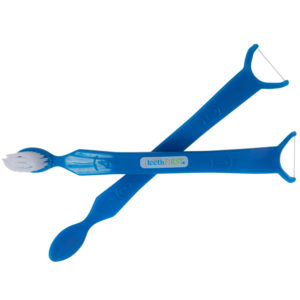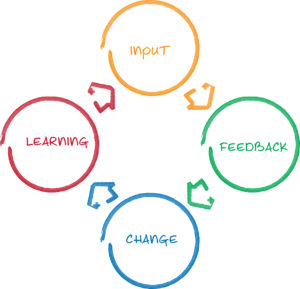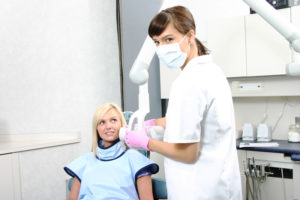Although your baby’s teeth will not pierce through the gums until around 6 months, the enamel on all of those baby teeth is already perfectly formed. Your job is to keep that enamel perfect by starting with a few good habits early, well before the first tooth appears.
Start cleaning your baby’s mouth, well before the first teeth appear.
This can be easily done with a damp baby facecloth and should be done after each feeding. Here is a short video demonstrating this practice.
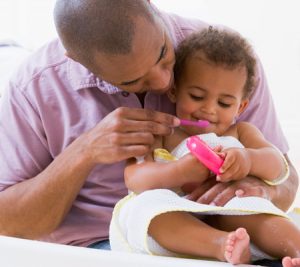
When the first teeth appear, you can continue using a damp cloth or you can switch to a soft baby toothbrush and using a tiny amount of fluoridated toothpaste. The amount of tooth paste you use should be no bigger than a grain if rice. The best position to brush your toddler’s teeth is from behind.
When the first teeth appear, it is also time to schedule your baby’s first dental visit
The American Academy of Pediatric Dentistry and the American Dental Association both recommend that babies be seen by a dentist no later that their first birthday. A study in the journal Pediatrics showed that children who have their first dental visit before age one have 40 percent lower dental costs in their first five years than children who do not.
When your baby only has a few front teeth, the brushing will only take about 20 seconds, but by the time your baby reaches 30 to 36 months of age and a full set of 20 baby teeth, you will need to switch to the next Stage toothbrush and you will need to brush for a whole minute. Using a timer is recommended as most people do not brush long enough, and anything less that one minute is not sufficient once your child has a full set of 20 baby teeth. Watch this excellent video to learn more…
It is important to change toothbrushes every 3 months. A good way to remember to change toothbrushes is to change with the seasons, March 21st, June 21st, September 21st and December 21st. Spring, Summer, Fall and Winter: new season, new toothbrush.
Start weaning your baby off night time feeding when the first teeth come in.
If you choose to continue night time feeding, then you must commit to brushing your baby’s teeth after that (those) feeding(s) too. The natural sugars of breast milk or formula will eventually lead to caries (tooth decay) if allowed to sit on your child’s teeth overnight.
You will have already started introducing solid foods before the first teeth appear and your baby no longer needs to be constantly feeding. If you choose to put juice in the baby bottle, it should be no more than 4 ounces, and it should be part of one meal, not something (s)he has access to all day long, or even worse, all night long. Water between meals and at night is the best beverage you can offer your child.
The Baby Oral Health Program, from University of North Carolina, Chapel Hill, offers a wealth of evidence based knowledge on how to care for your child’s first teeth.
